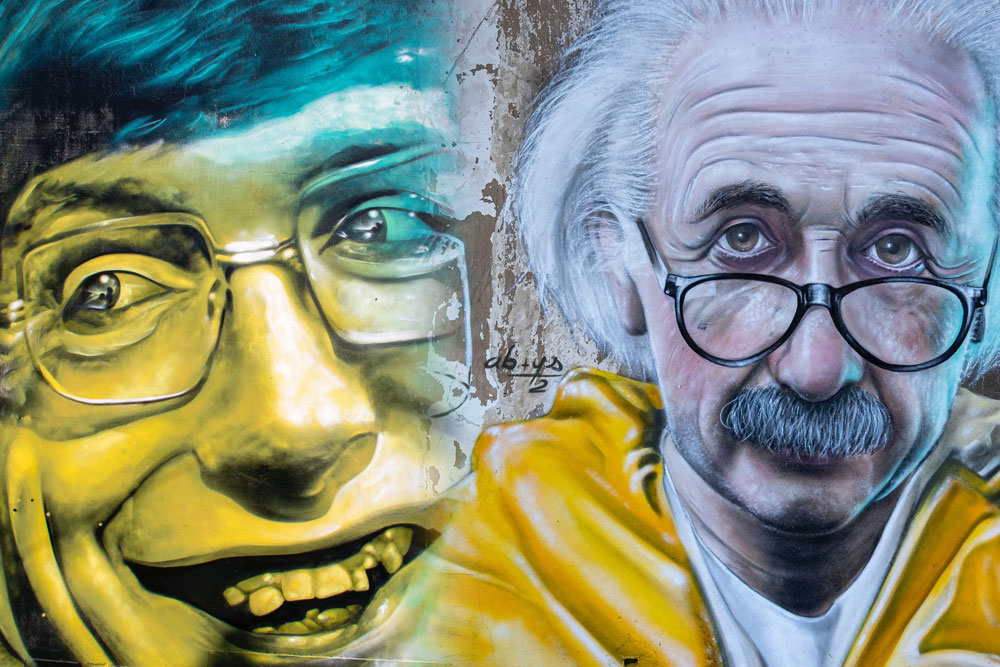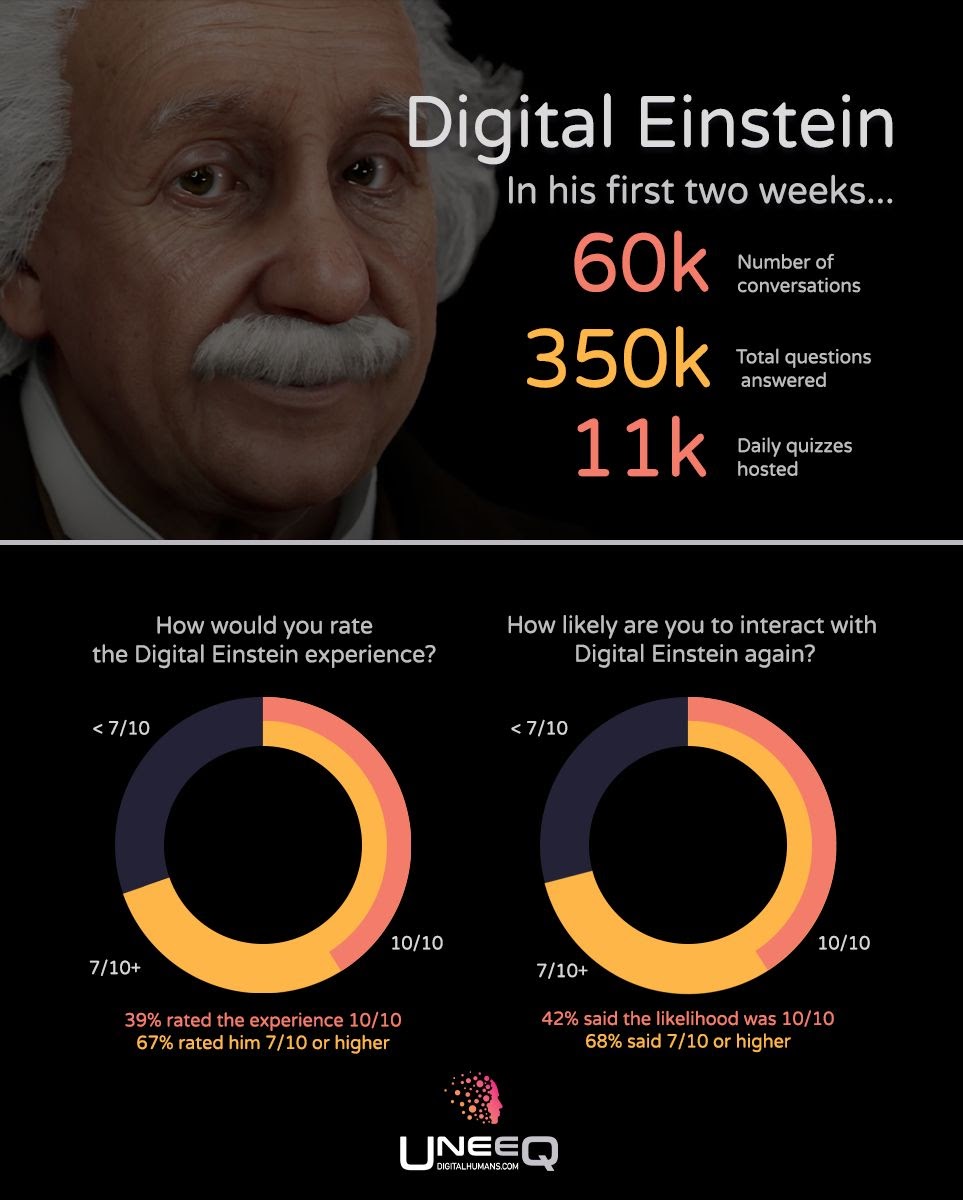Success Stories
What If Stephen Hawking Could Talk To Albert Einstein?
Explore what happens when two genius minds meet ✓ Imagine their conversation and ideas ✓ Now you can decide yourself ► Learn more here!

Timo Kunz, Co-founder & CEO
13. Oktober 2023

In April 2021, we had the honour of recreating Albert Einstein's voice in an immersive digital avatar experience (if you haven’t yet, give it a try here and read our story with TechCrunch). The response has been absolutely overwhelming. 3 months into the project, our friends from Uneeq have neatly captured the overall reactions of our beloved digital Einstein within its first two weeks of launching:

These numbers visibly indicate Einstein's impact in just a short amount of time; and, building on this, are unique user experiences that further reveal anecdotal stories of Einstein's true value. One of our most surprising discoveries was the emotional connection users felt when interacting with digital Einstein. To many, this was an opportunity to communicate with an iconic figure that otherwise they would have never met. Einstein passed away over 70 years ago, but his teachings and influence in understanding the world around us continue to echo till today. As humans, when we think of a person we know, our memory draws on three components: facial features, physical appearances and tone of voice. Each person has a distinctive voice that defines their worldly identity, and at Aflorithmic, we aim to replicate these unique voices to relive and redefine the boundaries of human connection. Next to stellar visuals, innovative engineering, and AI-driven Q&A, the immersive experience is brought to life in natural dialogue.
In 2018, another titan of Science passed away who had a lot in common with Albert Einstein: Stephen Hawking. They were both theoretical Physicists who died at the age of 76, universally known for their life-altering accomplishments within their respective fields. While Einstein won a Noble prize in 1921, in 1978,Hawking’s won the Albert Einstein Award.
Stephen Hawking - said to be the longest surviving ALS patient of all time - had a recognizable and synthesized voice, which he controlled with his eyelids. You can read more about the amazing story behind Hawking’s voice here. In fact, the synthesized voice was so much part of his identity that, once it was updated to a more modern (and better sounding) version, he asked to go back to the original version. The system behind Stephen Hawking’s iconic voice was named the Assistive Context-Aware Toolkit (ACAT) and its voice synthesizer was based on the DECtalk speech synthesizer that was developed in the 1980s. In honour of Stephen Hawking, we have now integrated a version of this synthesizer into api.audio for you to give it a try - like recreating Stephen Hawking’s famous 2012 Paralympics opening speech:
Unfortunately Einstein and Hawking never met and, given the results of Stephen Hawking’s time traveller party experiment, will probably never meet. However, perhaps in the future, AI driven representations of both of them will enable the conversation to finally manifest? Time Magazine once asked Hawking what he would have asked Einstein if given the chance. Based on his reply, we have created an audiotrack on what such an exchange might sound like:
Stephen: “Hi Albert, it is great to meet you. I have admired your work all my life and I don’t think I would ever get the chance to talk to you.”
Einstein: “My pleasure Stephen. Learning about your work now, I wish we would have been contemporaries as I am sure we could have done some fantastic research together.”
Stephen: “As one of my main interests has been in black holes, I want to ask you why you do not believe in them even though they are implied by the field equations of your theory of relativity.“
Einstein: “I knew you would ask that. It just never made sense to me. A large star or cloud of gas can collapse in on itself and even though theoretically possible, mass will always be thrown off and prevent the formation of a black hole.”
Stephen: “I see we have a lot to discuss, Albert.
You can now use the voice of Stephen Hawking’s famous speech synthesizer on API.audio. Register here and follow this recipe with a few lines of code. In homage to Hawking’s fantastic appearance in the Big Bang Theory, we named the voice “RollingThunder” (yes, we are nerds at heart!).
About:
Aflorithmic is a London/Barcelona-based technology company. Its api.audio platform enables fully automated, scalable audio production by using synthetic media, voice cloning, and audio mastering, to then deliver it on any device, such as websites, mobile apps, or smart speakers.
With this Audio-As-A-Service, anybody can create beautiful sounding audio, starting from a simple text to including music and complex audio engineering without any previous experience required.
The team consists of highly skilled specialists in machine learning, software development, voice synthesizing, AI research, audio engineering, and product development.
About AudioStack
AudioStack is the world's leading end-to-end enterprise solution for AI audio production. Our proprietary technology connects AI-powered media creation forms such as AI script generation, text-to-speech, speech-to-speech, generative music, and dynamic versioning. AudioStack unlocks cost and time-efficient audio that is addressable at scale, without compromising on quality.
